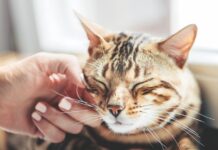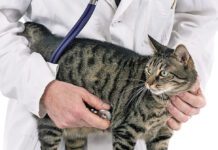Light Sticks, Potpourri Make Cat “Tox” List Just when you thought youd cat-proofed the house, along comes “The 10 Most Common Toxicoses in Cats,” as reported in
Besides the usual warnings – against nonsteroidal anti-inflammatory drugs (cats are twice as sensitive to ibuprofen as dogs), lily plants and acetaminophen (one adult-size tablet can be lethal to cats) – there are two holiday-time surprises: Light sticks and glow jewelry, so popular with trick-or-treating kids, can be punctured by feline teeth, releasing some of their content of dibutyl phthalate. Fortunately, the oily liquid is not terribly toxic to cats, but it has an unpleasant taste that can cause a cat to become agitated, drool and vomit. To see if the glowing chemical is on the cats fur, the journal advises, move to a darkened room and have a dampened washcloth handy.
Liquid potpourri, warmed over candles and electric gizmos, contains toxic (were not making this up) cationic detergent and essential oils. Cationic detergent can burn a cats mouth, skin and eyes and upset the gastrointestinal tract and central nervous system. Drooling is one sign of potpourri poisoning.
Moving through the cat “tox” list, number 10 is amphetamines (prescribed for humans) and nine is anticoagulant rodenticides (for mice and rats), while number three is the antidepressant (for humans) venlafaxine, which is marketed as Effexor. Topping the list, at numbers one and two, are canine permethrin insecticides and other topical insecticides meant for dogs. Toxicosis rankings came from the ASPCA Animal Poison Control Center, where operators are standing by at 888-426-4435.
Surprise: Most “Veggie” Cats Are Healthy
Researchers funded by Nestle Purina reported their “Evaluation of cats fed vegetarian diets and attitudes of their caregivers” in the
Journal of the American Veterinary Medical Association (Vol. 229, No. 1). Their study follows another that found that some commercial vegetarian cat foods fail to meet AAFCO Cat Food Nutrient Profiles for taurine, arachidonic acid and vitamin A.The latest study tested the blood of cats and quizzed owners in two categories: cats fed commercial or home-cooked vegetarian foods and dietary supplements, and cats on meat-based commercial diets.
The researchers found that all 34 cats on vegetarian diets were apparently healthy, in the judgment of their owners, and that blood tests for some select nutrients were essentially normal, at least for the 17 cats that were tested. Based on these findings, the studys authors called for long-term studies to see if cats could stay healthy for extended periods of time while being fed vegetarian diets proven to be nutritionally complete.
As for “attitudes of caregivers,” keepers of vegetarian cats cited “ethical reasons” for feeding cats that way.
Yet Another Cat-titudinal Study
Reading further in the same issue of
JAVMA, we were strangely drawn to this title: “Outdoor fecal deposition by free-roaming cats and attitudes of cat owners and nonowners toward stray pets, wildlife and water pollution.”The study area covered three communities near the University of California-Davis with an estimated 7,284 owned cats and 2,046 feral cats. Skipping over sad details about sea otters in Half Moon Bay dying of
Toxoplasma gondii and how that parasite gets there, well state the researchers findings: The feral cats of Cayucos, Los Osos and Morro Bay, California, contribute 29.5 tons of “fecal loading” to the environment each year. Owned cats with outdoor privileges leave 76.4 tons.Summarizing attitudes, the UC Davis researchers reported that, compared to people without cats, cat owners were more likely to oppose trapping cats and impounding strays, for fear of euthanasia. And they conclude that “more emphasis should be placed on encouraging cat owners to keep their cats inside and collecting feces in litter boxes.”
v


